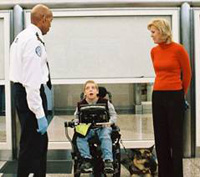Travelers with Disabilities and Medical Conditions
Air Travel

One of the primary goals of the Transportation Security Administration (TSA) is to provide the highest level of security and customer service to all who pass through our screening checkpoints. Our current policies and procedures focus on ensuring that all passengers, regardless of their personal situations and needs, are treated equally and with the dignity, respect, and courtesy they deserve. Although every person and item must be screened before entering each secure boarding area, it is the manner in which the screening is conducted that is most important.
In order to achieve that goal, TSA has established a program for screening of persons with disabilities and their associated equipment, mobility aids, and devices. Our program covers all categories of disabilities (mobility, hearing, visual, and hidden). As part of that program, we established a coalition of over 70 disability-related groups and organizations to help us understand the concerns of persons with disabilities and medical conditions. These groups have assisted TSA with integrating the unique needs of persons with disabilities into our airport operations.
Since the initial total ban on liquids, gels and aerosols took effect on August 10, we have learned enough from the UK investigation to say with confidence that small, travel size liquids are safe to bring through security checkpoints in limited numbers. We are confident in our increased security measures throughout the airport. Therefore, passengers can purchase drinks in the secure boarding area and bring them aboard their flights.
TSA's checkpoint security screening procedures for persons with disabilities and medical conditions have not changed as a result of the current threat situation. All disability-related equipment, aids, and devices continue to be allowed through security checkpoints once cleared through screening.
Additionally, we are continuing to permit prescription liquid medications and other liquids needed by persons with disabilities and medical conditions. This includes:
- All prescription and over-the-counter medications (liquids, gels, and aerosols) including KY jelly, eye drops, and saline solution for medical purposes;
- Liquids including water, juice, or liquid nutrition or gels for passengers with a disability or medical condition;
- Life-support and life-sustaining liquids such as bone marrow, blood products, and transplant organs;
- Items used to augment the body for medical or cosmetic reasons such as mastectomy products, prosthetic breasts, bras or shells containing gels, saline solution, or other liquids; and,
- Gels or frozen liquids needed to cool disability or medically related items used by persons with disabilities or medical conditions.
However, if the liquid medications are in volumes larger than 3 ozs each, they may not be placed in the quart-size bag and must be declared to the Transportation Security Officer. A declaration can be made verbally, in writing, or by a person's companion, caregiver, interpreter, or family member.
Declared liquid medications and other liquids for disabilities and medical conditions must be kept separate from all other property submitted for x-ray screening.
For more information on these measures, please read our letter outlining this policy -- Changes in Allowances for Persons with Disabilities at Airport Security Checkpoints (pdf, 101Kb)
Ad Council Video
- Click here to see our video on self select lanes.
Disability-related items permitted through the security checkpoint include:
- Wheelchairs
- Scooters
- Crutches
- Canes
- Walkers
- Prosthetic devices
- Casts
- Support braces
- Support appliances
- Service animals
- Baby apnea monitors
- Orthopedic shoes
- Exterior medical devices
- Assistive/adaptive equipment
- Augmentation devices
- Ostomy supplies
- CPAP machines & respirators
- Hearing aids
- Cochlear implants
- Tools for wheelchair disassembly/reassembly
- Personal supplemental oxygen
- CO2 personal oxygen concentrators
- Tools for prosthetic devices
- Medications and associated supplies
- Braille note takers
- Slate and stylus
- All diabetes related medication, equipment, and supplies
- Any other disability-related equipment and associated supplies
Please refer to the links below to assist you as you make travel preparations:
- Introduction
- Before You Go
- Tips For The Screening Process
- Mobility Disabilities
- Hearing Disabilities
- Visual Disabilities
- Hidden Disabilities
- Assistive Devices and Mobility Aids
- Service Animals
- Children with Disabilities
- Medical Conditions and Special Situations
Additional Resources
If you have additional concerns or questions you can also contact TSA's Call Center.
E-mail - tsa-contactcenter@dhs.gov
For concerns about potential civil rights violations, you can contact TSA's Office of Civil Rights.
Toll-free - 1-877-336-4872
TTY - 800-877-8339
E-mail - tsa-contactcenter@dhs.gov
For information about overall air travel accessibility:
DOT Air Carrier Access Hotline
Toll-free - 1-800-778-4838
Internet - http://airconsumer.ost.dot.gov


